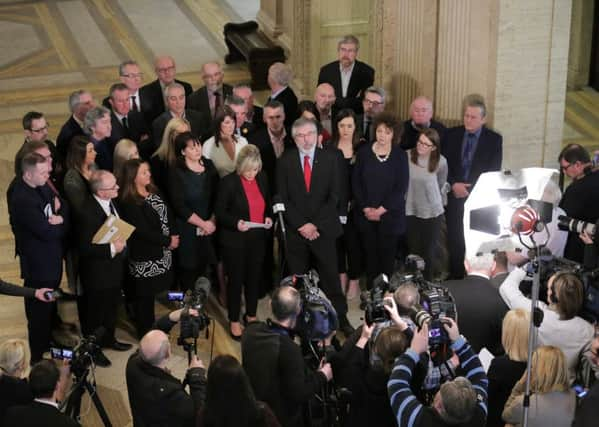Sam McBride: Risks for SF if it attempts to overplay its strong hand


What has taken place – the usurping of unionism as the majority at Stormont for the first time since the creation of the state in 1921 – is of profound significance.
Even if unionism rallies in a future election and regains its majority – as may well happen in circumstances more favourable to the DUP and UUP – the pro-Union population of Northern Ireland has had a glimpse into their likely future if the unionist parties cannot attract non-traditional unionists to support them.
Advertisement
Hide AdAdvertisement
Hide AdThe slowly but inexorably changing demographics of Northern Ireland, with a growing Catholic population, have major implications for the future makeup of Stormont.
In such circumstances, Sinn Fein has multiple reasons to not only be cheered by the result of this election, but to see for itself an inbuilt demographic advantage in every future election as more and more voters who more likely to vote for Sinn Fein than for any other party join the electoral register.
It would therefore be tempting for many republicans to drive a hard bargain in the current talks, with the threat of fresh elections if the DUP and the government don’t accede to their demands.
Already, the most senior Sinn Fein councillor in Belfast, Jim McVeigh, has said that in the absence of the government agreeing to a border poll “why don’t we go full blast for the biggest party and first minister?”
Advertisement
Hide AdAdvertisement
Hide AdBut the party only needs to look back ten months to see how quickly a stunning electoral triumph can be reversed.
Last May, Arlene Foster returned at the helm of a party which had 38 seats – ten ahead of Sinn Fein; both nationalist parties had lost support and Mrs Foster was the fresh face of the DUP, retaining the party’s core support while breaking out into segments of the electorate where her predecessors failed to attract votes.
But, partly through over-confidence on Mrs Foster’s part, she now finds herself in a precarious position, having presided over what Alex Kane yesterday described as the worst result for unionism in his lifetime.
Sinn Fein has been remarkably coy about its red lines, with the exception of the demand for Mrs Foster’s removal as First Minister.
Advertisement
Hide AdAdvertisement
Hide AdBut it has a long shopping list, with everything from an Irish language act to structures for investigating aspects of the Troubles and the renaming of Stormont’s diarchy as the ‘Joint First Ministers’.
With the mandate it has, and the weakened state of the unionist parties, Sinn Fein can expect to secure something out of the talks which are now commencing.
But it would be very easy for Gerry Adams to overreach, as he did when Sinn Fein believed it could stop welfare reform and took years to accept that it could not and could only hope to partially mitigate the changes brought in by London.
If devolution fails to return because of a Sinn Fein demand over something such as an Irish language act or that Secretary of State James Brokenshire should not be able to chair the talks, the party would be taking a big risk.
Advertisement
Hide AdAdvertisement
Hide AdTo a large swathe of nationalist opinion, such a move would reinforce the strategy which that electorate has just endorsed – a tough stance with the DUP.
But there is an imperative towards resolving the current situation quickly.
In 25 days’ time, Stormont will have no budget. Under emergency legislation, the Departmen of Finance’s permanent secretary can allocate a portion of last year’s budget – but he legally cannot spend even all of last year’s budget.
Already there are major financial problems in health and school budgets.
Advertisement
Hide AdAdvertisement
Hide AdGiven the scale of the public sector in Northern Ireland, a swathe of the electorate could rapidly turn on Sinn Fein if that party is seen to be recklessly endangering jobs or lives in an attempt to secure political concessions.